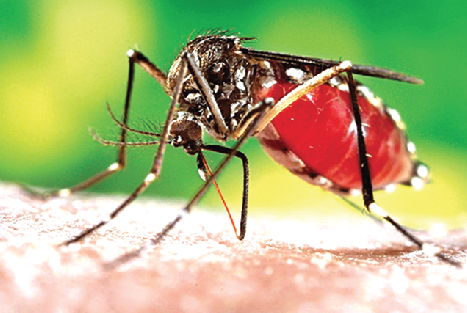
Sporadic yellow fever outbreaks cause for concern
Ghana is currently dealing with a yellow fever outbreak and according to the Ghana Health Service (GHS), 25 people have died of the disease so far, and 18 others are on admission.
The outbreak was first detected in the Savanna Region and it is spreading swiftly and sporadically to other parts of the country.
Advertisement
Common symptoms
Yellow fever is an acute viral haemorrhagic disease transmitted from person to person by infected mosquitoes of the aedes aegyptus species.
The "yellow" in the name refers to the jaundice that affects some patients. Common symptoms of yellow fever are fever, headache, jaundice, muscle pain, nausea, vomiting and fatigue.
The disease is endemic in tropical areas of Africa (47 countries) as well as Central and South Americas (13 countries).
It takes the yellow fever virus about three to six days to incubate in a person’s body. However, some people do not experience any of the symptoms.
Yellow Fever is sometimes difficult to diagnose because a more severe case may present like severe malaria, leptospirosis, viral hepatitis (especially fulminant forms), other haemorrhagic fevers, infection with other flaviviruses (e.g., dengue haemorrhagic fever) and poisoning.
Yellow fever is a lethal disease with a case fatality rate of 50 per cent or higher and it has no specific treatment, making the management of its patients extremely difficult.
The good news, though, is that it is empirically and clinically established that quality, timely and responsive supportive treatment at hospitals has the tendency to improve survival rates.
Historical
It is on record that yellow fever was first discovered in Yucatan in Mexico in 1648. The disease later spread to other parts of the world especially as a result of the erstwhile slave trade.
It later became endemic in various parts of Africa. In fact, Africa experienced more calamitous effects of the disease in the 1980s.
In Nigeria alone, over 5,000 people died of the disease in 1986 and in the ensuing year (1987), about 1,900 deaths were recorded for the disease in that country.
In the 1920s, some medical laboratory scientists came from other continents to help fight the disease in Africa but eventually died of the same disease they were fighting.
Notable among those fallen heroes are Andrian Stokes, Edward Haynes, William Young and Hideyo Noguchi whose name was eponymously given to the University of Ghana -based Institute of Medical Research.
Preventive Measures
Mindful of the stark reality that the disease does not have a cure, various preventive measures are required to protect oneself and a given population.
Vaccination is, therefore, the most important measure required to prevent the disease.
However, infants less than nine months, pregnant women, people with severe allergies to egg protein and people with severe immunodeficiency due to symptomatic HIV/AIDS are excluded from the vaccination except that pregnant women may be vaccinated during an outbreak, especially when the risk of infection is high.
Fortunately, the yellow fever vaccine is extremely effective, safe and affordable.
A single dose of the vaccine suffices for sustained immunity and life-long protection against the disease.
As such a person who takes the vaccine does not need a booster dose but the disease does not have a specific anti-viral medication.
Countries are mandated by legally binding International Health Regulations (IHR) to request international travellers to provide yellow fever vaccination certificates as part of the travel documents.
Another preventive measure in fighting the spread of the virus is vector control.
This calls for destroying the breeding sites for mosquitoes. Personal preventive measures such as clothing, minimising skin exposure and repellent use are recommended to avoid mosquito bites.
However, the use of insecticide-treated bed nets is limited by the fact that the Aedes mosquitoes bite during the daytime.
It is in line with this that the Director-General of the GHS, Dr. Patrick Kumah-Aboagye, urged residents of the Wenchi Municipality and other affected areas in Ghana to cover themselves properly to save them from mosquitoes that cause the disease.
WHO Agenda
The World Health Organisation (WHO) intends to wipe out Aedes mosquitoes through the Eliminate Yellow Fever Epidemics (EYE) Strategy launched in 2017.
Fortunately, the EYE initiative supports 40 at-risk countries in Africa and the Americas to prevent, detect, and respond appropriately and swiftly to yellow fever outbreaks.
Expectedly, more than one billion people will be protected against the disease by 2026. Currently, for example, the WHO is carrying out emergency vaccination campaigns in Angola and the Democratic Republic of the Congo (DRC).
The target is to protect over 14 million people against the disease mindful of the fact that the outbreak had already caused over 400 mortalities.
The Global Alliance for Vaccines and Immunisation is very instrumental in this regard.
Conclusion
The yellow fever disease is deadly and has no cure, hence prevention is necessary. Accordingly, Ghanaians, especially those in the outbreak areas currently, must adhere to the preventive measures discussed so far.
The best preventive measure available is to receive the vaccine.
Also, taking a cue from the deaths of the Japanese Bacteriologist, Hideyo Noguchi, and his colleagues who got the viral infection on duty in the laboratories and died of the disease as a result, our biomedical and other diagnostic scientists in the health sector of Ghana must be extremely cautious when testing blood samples.
The Ministry of Health and the GHS must also make the vaccines available to user areas in adequate quantities and on time.
The writer is a Health Service Administrator
[email protected]




